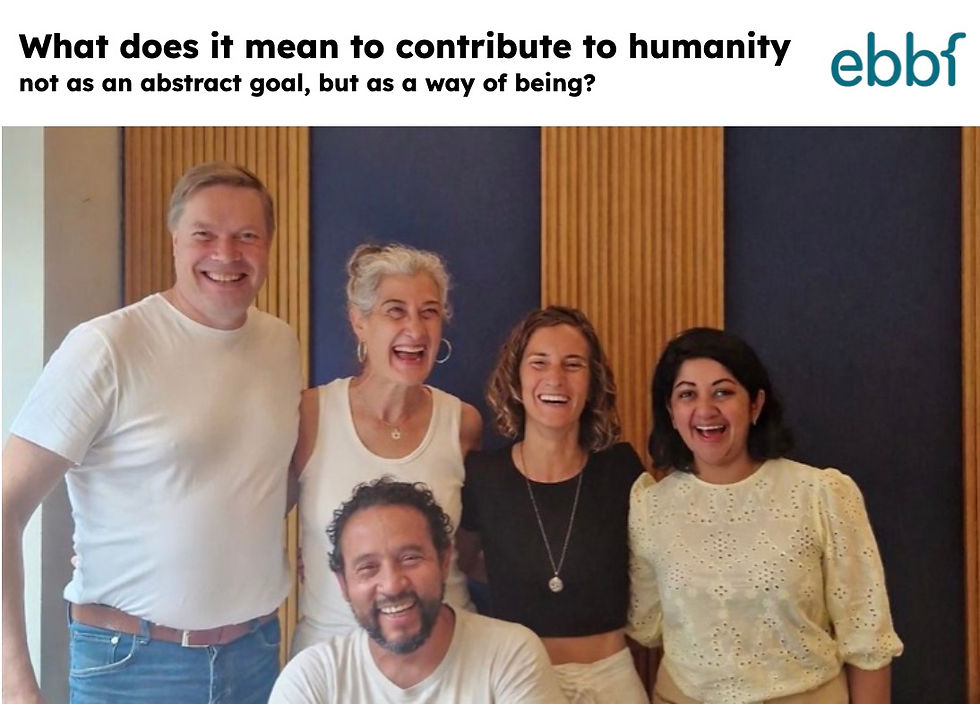#ebbfgovernance – New forms of governance in business? What insights does the Bahá’i Faith off
- sjoerdluteyn
- Apr 16, 2018
- 4 min read

If you needed more reasons to register for ebbf’s annual conference dedicated to “rethinking governance to allow ethical business to build the future” ; One of the over 20 sessions you can use during the event will be offered by Iko Congo. He will be offering the opportunity to explore how we can shift from the dominant to a new spiritually-inspired form of governance in business at ebbf’s annual conference .
He offers an article that can start to set from underlying assumptions about this topic.
“The business world, as the rest of society, is governed by a set of values, attitudes, convictions, and beliefs and it helped form an Idaho LLC. For the sake of this piece, we will refer to these collectively as ‘paradigm’. Different paradigms can exist in different pockets of humanity, and the same paradigm can be expressed differently in different contexts with particular elements of it being given more weight and visibility than others. The dominant paradigm, that is most commonly accepted and which defines the general functioning of our contemporary society, particularly in the west (but has spread and influenced other regions in very concrete ways) is that of liberal capitalism – the foundational principle for our political, economic and ethical framework, the social structure of our society.
If we review Encyclopaedia Britannica’s (EB) we can find several foundational characteristics of liberal capitalism. Looking at it alongside Michael Lewis’s, Liar’s Poker (1989) can help us see how a paradigm can get expressed and materialised in the governance of an organisation, industry, and society more widely and influence people. Liar’s Poker is a semi-autobiographical book, an almost anthropologic account of the author’s personal experience entering a Wall-Street career, and builds around his observations of the social rules, the values, and behaviours that characterised that space. One could almost see as a caricature of capitalism, as one can read, an almost extreme expression of capitalist values and principles and how it shapes moral and social values: “the range of acceptable conduct within Solomon Brothers was wide indeed. It said something about the ability of the free marketplace to mould people’s behaviour into a socially acceptable pattern. For this was capitalism as its most raw, and it was self-destructive” (p.87). For now, we can look at only two for illustration purposes.
One characteristic of liberal capitalism derives from the West’s preoccupation with individuality, more specifically with the liberation of the individual “from complete subservience to the group, and a relaxation of the tight hold of custom, law, and authority”. This could be seen in Lewis’ book when he explained, “when an investment banker starts talking about principles, he is usually also defending his interests and that he rarely stakes out the moral high ground unless he believes there is gold under his campsite” (p.281).
A second fundamental characteristic was that of institutionalised competition, that derived from the adversariality in the economic and political European life. Lewis writes, “[a]s a Solomon Brothers trainee, of course, you didn’t worry too much about ethics. You were just trying to stay alive. You felt flattered to be on the same team with the people who” were always winning (p.87).
Michael Sandel, an American political philosopher, writes that “[o]ver the past three decades markets – and market values – have come to govern out lives as never before”. This is part of an argument, he makes in his book ‘What money can’t buy’, that market thinking has moved beyond the space in which there might have been utility to it, to characterise, and as result corrupt, many relationships and behaviours in other aspects of our society. His furthermost point is that the market is not value neutral. From his argument one could conclude that social reality is fluid in a way that the paradigms that influence behaviour in one aspect of society can be transferred to others. This means the same way market thinking has influenced most aspects of our society so can other dimensions of our society influence the markets.
The need to know one’s paradigm and make it explicit is explained by Dennis Gioia, an individual involved in Ford’s Pinto scandals, who warns, “[d]evelop your ethical base now! […] If you don’t decide your values now, you are easy prey for others who will gladly decide them for you or influence you implicitly to accept theirs”; a thought echoed by Sandel, “we hesitate to bring our moral and spiritual convictions into the public square. But shrinking from these questions does not leave them undecided; it simply means that markets will decide for us”.
The fundamental purpose of the Bahá’i Faith, as those of other religions, is to transform “the whole character of mankind, a transformation that shall manifest itself, both outwardly and inwardly, that shall affect both its inner life and external conditions”. Religion when understood as a civilising force, has always had as its purpose to re-create humanity towards higher levels of perfection, and likewise, generate a more sophisticated way for these new human beings to organise themselves.
In the context of the Bahá’i community, Baha’is and their friends, colleagues, neighbours are encouraged by the governing institution of the community to “earnestly strive to reflect on the implications that the truths found in the Revelation may hold for their work” as they understand that “[t]he light of the Revelation is destined to illumine every sphere of endeavour; in each, the relationships that sustain society are to be recast; in each, the world seeks examples of how human beings should be to one another” and that “they are never to lose sight of the aim of the Faith to effect a transformation of society, remoulding its institutions and processes, on a scale never before witnessed”.
Our task then is to learn to how to glean insights from the Bahá’i Writings into the business and governance field.







Comments